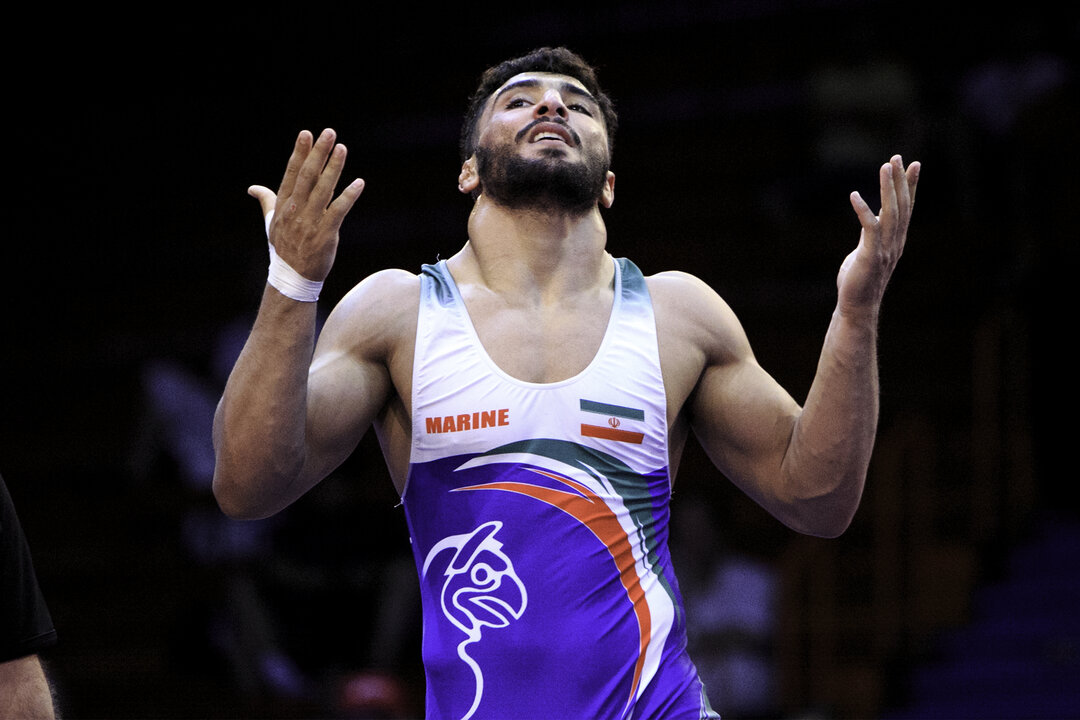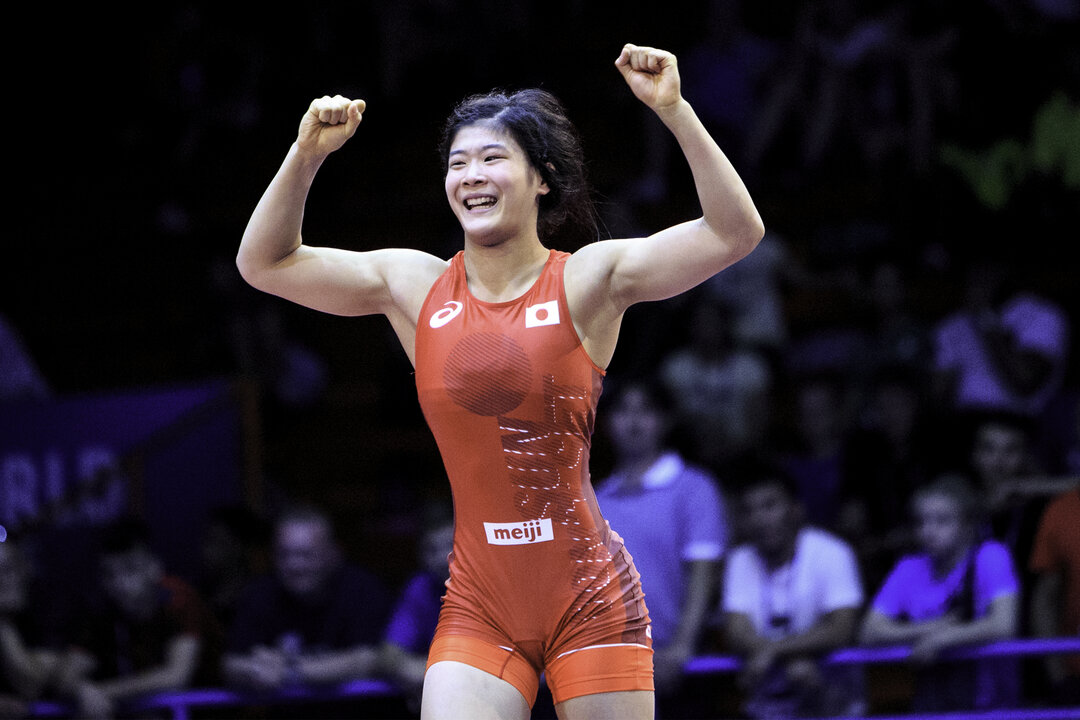Weekly FIVE! July 09, 2018
Monday, July 9, 2018 - 14:39 By Eric Olanowski

Taking a look at Iran doubling up on World Championship team titles and Iakobishvili stealing Tbilisi gold from Olympic champ Ramonov. Also looking at reigning world champion Yui SUSAKI (JPN) earning her shot at defending her world title in Budapest.
1. Reigning World Champ Susaki Rallies Past Irie To Earn Second Straight World Team Spot
Reigning world champion Yui SUSAKI (JPN) earned a shot at defending her world title after rallying from a four-point deficit, scoring the winning takedown with 15 seconds left to defeat Yuki IRIE (JPN) 6-4 in a special playoff for the women's 50kg spot on Japan's team to the world championships in Budapest in October.
"My feeling right now is that I'm glad I earned the spot on the world championship team and that this year I will win a second straight world title," Susaki said.
This weekend's win comes after the 19-year-old was dealt a stunning loss by technical fall to Irie in the Emperor's Cup semifinals. She avenged that defeat with a victory by fall in the final at the Meiji Cup to set up the featured showdown of the playoffs where she was victorious (6-4) in earning her second straight world team spot.
 df. Aleksei MILESHIN (RUS) -2.jpg) Mohammad NOSRATI (IRI) celebrates after winning the 92kg Greco-Roman gold medal. (Photo by Max Rose-Fyne)
Mohammad NOSRATI (IRI) celebrates after winning the 92kg Greco-Roman gold medal. (Photo by Max Rose-Fyne)
2. Iran Doubles up on Cadet World Team Titles
Iran capped off the 2018 Cadet World Championships in dominant fashion, winning team titles in both freestyle and Greco-Roman.
In freestyle, Iran claimed three gold medals from four finalists, including wins from Rahman AMOUZADKHALILI (IRI) at 48kg and Ali Reza ABDOLLAHI (IRI) at 92kg on the final day, helping the Iraniaseparateate themselves in the team race.
Iran then followed up their freestyle performance up by capping off the Greco-Roman portion of the tournament with four finalists and two champions, finishing 22-points ahead of the second-place finishers, Russia (108 points).
 df. Anna Hella SZEL (HUN)-2.jpg) Nonoka OZAKI (JPN) was one of six Japanese female wrestlers to capture a gold medal at the 2018 Cadet World Championships. (Photo by Max Rose-Fyne)
Nonoka OZAKI (JPN) was one of six Japanese female wrestlers to capture a gold medal at the 2018 Cadet World Championships. (Photo by Max Rose-Fyne)
3. Japan Women Collect Six Cadet Gold Medals
Japan scooped up their eighth-consecutive Cadet World Championship, scoring nearly 100 points more than India who finished in second-place.
The Far East nation pulverized the competition on the opening day of women’s wrestling action, winning four gold medals. They followed that up with two additional gold medals on the second day of competition, bringing their tournament total to an impressive six out of ten possible gold medals.
Also of note in women’s wrestling, Macey KILTY (USA) and Emily SHILSON (USA) claimed gold medals for the United States, marking the first time in history that two American Cadets have won women’s freestyle world championships.
Final team results
1. Japan - 210
2. India - 111
3. China - 110
4. Russia - 109
5. USA - 108
6. Ukraine - 99
7. Mongolia - 65
8. Belarus - 63
9. Azerbaijan - 36
10. Hungary – 30
4. Iakobishvili Steals Tbilisi Gold from Olympic Champ Ramonov
Reigning world champion Zurabi IAKOBISHVILI (GEO) electrified the Georgian crowd, scoring the go-ahead takedown with 15-seconds left over Olympic champion Soslan RAMONOV (RUS) to steal the 70kg Tbilisi Grand Prix gold medal, 3-2.
Trailing by one-point with under 15-seconds remaining, the Georgian shot a studder-step double, freezing for a split-second before re-attacking with a right-handed high-crotch, scoring the lead-changing takedown and ultimately his first Tbilisi Grand Prix gold medal.
5. India Set to Host Asian Junior Championships July 17-22
The I.G. Sports Complex in New Delhi, India is set to host the 2018 Junior Asian Championships starting on July 17.
This is the second junior continental championship (Junior African Championships) but is the first of three that will take place over the next month.
The Junior European Championships begin July 30 and will be followed by the Junior Pan-American Championships which take place August 17-19.
Weekly FIVE! In Social Media
1. It's Summer! Time to go out and train!?
Лето вошло в полную силу! Пора тренироваться на свежем воздухе! ? @jolaman_sharshenbekov
#wrestling#training#workout#motivation#coolvideo#кыргызстан#тренировка#лето#борцы#summer#summermood
2. Big Move from Day 6 of the Cadet World C'Ships
فن برتر روز ششم کشتی نوجوانان جهان
#Zagreb2018 !
3. KAZ ?? Defeats GEO ?? in a close match #uww #unitedworldwrestling #wrestling#grecoroman #cadets
4. Day 6 of Cadet World Championships.................HERE. WE. GO. ? ? ?♂️ #uww #unitedworldwrestling #wrestling#grecoroman #cadets
5. Reigning world champion @petro700 explosive second-period start sparked him to a #TbilisiGP2018 gold medal, avenging his February loss to Ukraine's Aleksander KHOTSIANIVSK.


 Over 100 participants competed in the national youth tournament during the
Over 100 participants competed in the national youth tournament during the
Share your thoughts.
Comments